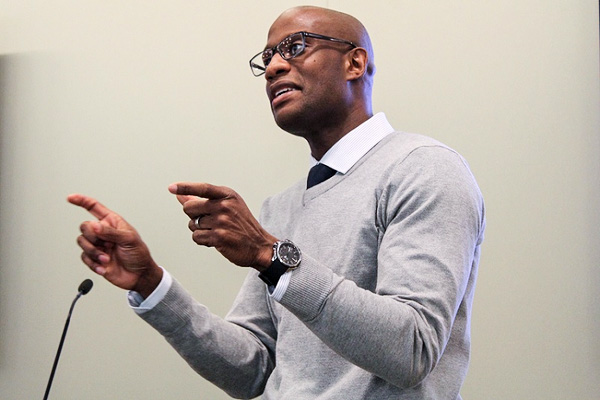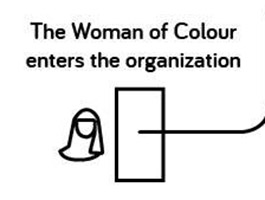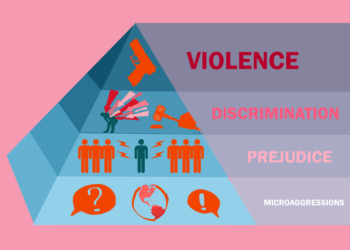As a Society for Scholarly Publishing (SSP) Board member, I am hugely proud of the progress our organization has made in recent years toward addressing issues around diversity, inclusion, and social equity, including playing a leadership role in the formation of C4DISC (Coaltion for Diversity & Inclusion in Scholarly Communications) and establishing a Diversity & Inclusion (D&I) Task Force.
We still have a long way to go, to be sure, but — if I’m doing the math right! — this year’s Annual Meeting features more D&I content than ever before. This includes what promises to be an unmissable opportunity for anyone who wants to truly walk the walk on diversity and inclusion — a pre-conference workshop on Identifying and Responding to Micro-aggressions at Work, facilitated by Dr. Joseph Williams, a scholar and expert in multicultural and social justice training. If you’re attending the SSP meeting, we hope that this interview with Dr Williams will be all the inspiration you need to sign up for the workshop; if you’re not attending, then this is your chance to learn a bit more about micro-aggressions, and why we must all take responsibility — individually and collectively — for recognizing and addressing them.

Please can you tell us a bit about yourself — where you work, your areas of interest, why and how you chose this path?
I am an Associate Professor in the Curry School of Education and Human Development at the University of Virginia. My research interests include multicultural and social justice training practices for (K-12) counselors, educators, and other helping professionals. In addition to publishing scholarly articles and book chapters in this area, I also consult with schools, communities, associations, and corporations to improve diversity and inclusion efforts, and engage people in productive dialogue and action. My interest in this area was born out of my own personal experience dealing with well-intended, color-blind approaches to creating culturally inclusive working and learning environment.
We are privileged that you’ll be leading an SSP pre-conference workshop on micro-aggressions. Psychology Today defines these as: “everyday verbal, nonverbal, and environmental slights, snubs, or insults, whether intentional or unintentional, which communicate hostile, derogatory, or negative messages to target persons based solely upon their marginalized group membership.” The definition seems straightforward. What is it about microaggressions that people struggle with the most?
It has been my experience that people oftentimes struggle with the reality that many micro-aggressions come from people with good intentions. However, your intentions do not matter, it’s the impact of your words or actions that matter. For example, If I accidentally step on your foot and break your toe — it doesn’t matter if I didn’t intend to do it — your toe still hurts. Therefore I am responsible and have an obligation to apologize. It’s a matter of intent vs. impact.
Can you share some examples of micro-aggressions that you’ve either witnessed or experienced yourself?
Even better, here is an example of a micro-insult (i.e., verbal and nonverbal communications that subtly conveys rudeness and insensitivity as well as demeaning a person) from the scholarly publishing community:
“I was the only person of color in my department. When I asked the administration why they didn’t do outreach to more students of color or promote people of color, the answer from the HR rep was, “We can never find any black students who are qualified or are able to pass our proofreading tests. You were our first and we were really surprised when you passed. Usually people like you don’t make it past the first round. And since there are so few to begin with, there aren’t any to promote.” “I left six months later.”
(From On Being Excluded: Testimonies by People of Color in Scholarly Publishing)
How widespread are micro-aggressions? Do you think they’re on the increase — either in general, or in relation to any specific communities?
Micro-aggressions show up in our everyday interactions with people and institutions. I do not believe they have increased over the years — I believe they have always been prevalent in our society. The only difference is that we now have the language and framework to identify and better understand them.
What can we do, both as individuals and collectively, at the organizational level, do to recognize and address micro-aggressions?
You’ll have to come to the workshop to find out! Nonetheless, I will give you one hint — start with recognizing and overcoming your own implicit biases.
Who should sign up for the pre-conference workshop at SSP, and why?
Anyone who works, lives, or socializes with others. Because we all are vulnerable to engaging in micro-aggressions as they relate to the social identity of others (e.g., gender, age, race/ethnicity, class, religion, etc.).
What do you hope people will take away from the workshop?
I believe people will:
- Learn how to identify micro-aggressions
- Understand the harmful impact of micro-aggressions
- Discuss and practice strategies for responding to micro-aggressions at work and in everyday situations
What do you hope people will take away from this post?
I hope those who believe in the existence and harmful impact of micro-aggressions will be encouraged to attend and learn practical strategies for interrupting micro-aggressions. However, secretly, I hope that the naysayers who read and disagree with my position will also be encouraged to attend (with an open-mind) and have a productive dialogue with me and others.
You can learn more about Dr Williams’ pre-conference workshop on the SSP website.
Discussion
8 Thoughts on "Identifying and Responding to Micro-aggressions at Work: An Interview with Dr. Joseph Williams"
I appreciate that this discussion frames micro-aggressions as “based solely upon their marginalized group membership”. I am increasingly reading the term used in the context of general workplace bullying, without regard to whether the target is a member of a marginalized group or even whether there is an intent to discriminate. This is concerning, because many of the specific behaviors described as micro-aggressions can be performed by people who are on the autistic spectrum without any malicious intent. This creates a lack of balance between the “victim” who may have no marginalized group membership reports their perception of such “bullying” and, ironically, the accused who themselves have a disability which does put them in such a group, such that the accused is ordered to “stop” without regard for their ability to do so.
Virtually any behaviour or interaction can be classed as a micro aggression. You don’t even need to say anything or intend to hurt someone – it could be a nonverbal cue or even something environmental. Frown at the wrong moment? You’re now a microaggressor who needs to apologise. I don’t take Psychology Today seriously at the best of times but that definition is basically a green light to play the victim card at will. Do we really want a workplace where disagreements are settled based on people’s minority/victimhood credentials?
Hi Anonymous,
Thanks for weighing in. However, I would push back on the notion that virtually any behavior or interaction can be classified as a microaggression. During the workshop, I hope to help the audience distinguish between WHAT IS and WHAT IS NOT a microaggression – less we run the risk of inappropriately labeling everything a microaggression.
An additional annual meeting plug–the SSP’s Diversity and Inclusion Task Force has organized a workshop, “Diversity, Equity, and Inclusion Efforts in Practice,” that will be held Friday, May 31, from 1:45 pm – 2:45 pm. Join us to talk about your organization’s existing efforts or getting started with inclusion work.
Oh, excellent! I am unable to make the pre-meeting seminar, but will attend this session for sure. Thanks!
My favorite micro-aggression has nothing to do with race or gender. It’s the person in your office who greets you, “You look tired.” I’ve learned to ignore such rudeness but it’s very tempting to reply, “You seem judgmental.”
While I agree with the above, it needs to be pointed out that there are micro-aggressions and bullying that occur when a “marginalized group” is neither the victim nor the aggressor. I have great experience with that having been the victim of such at OUP for nearly 15 years. And, I am not alone in this regard. HR was no help as they often were the cause of, or were in support of, the micro-aggressions and bullying that was happening to many of us on a daily basis. I really wish that these types of actions were addressed, and not just those that involve a “marginalized group.” When one is subject to constant needling by management over one’s performance or performance of their team, when working 80 hours per week without a day off, that is also micro-aggression. Nothing ever tips the scale of being “illegal” but it is certainly immoral and unethical to be told daily that you and your team are worthless simply because you don’t do things exactly as a certain executive wants, despite being in direct conflict with one’s own directives from one’s own management staff. As well, being expected to work such long and tiring hours to then be accused of being a “whiner” by HR itself is also a form of workplace aggression and bullying. Funnily enough, while this was my own personal experience at OUP, I also saw on many occasions the examples cited above on workplace diversity. Countless, in fact. But, when HR is part of the problem, what is one to do?
Micro-aggressions can also happen due to bad expectation management both by the employee and the employer. General dissatisfaction at how career moves (esp. in publishing); the sense of not being taken seriously or heard; disappointment from effort vs. outcome, and a distrust in the company’s business model and responsibility, all these also bundle up into these micro-aggressions. It is not always bullying or discrimination, while they are also predominant reasons, but these introspective aspects that lead to behavioral issues.



